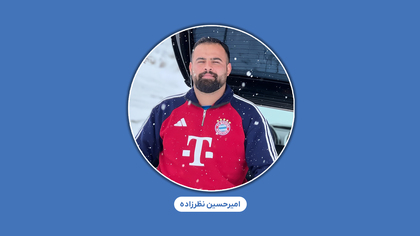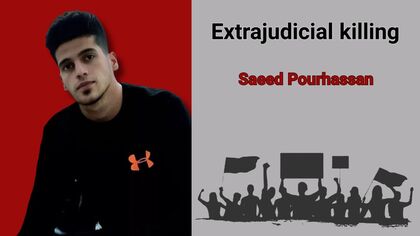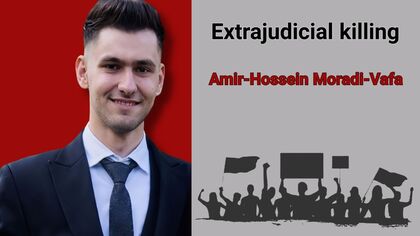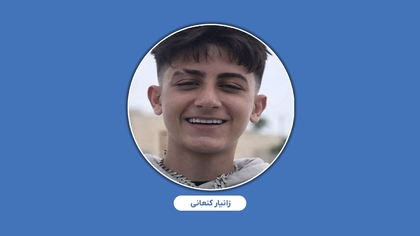Persecution of Iranian defence lawyers is blatant
15:39 - 21 November 2011

Amnesty International deplores the statement at a UN press conference on 16 November 2011 by Mohammad Javad Larijani, the Secretary General of the Judiciary’s High Council for Human Rights, that “o lawyer is in prison because he is a lawyer or he is a defender of human rights.”
This statement blatantly contradicts the truth of the situation - that many courageous defence lawyers who have agreed to defend political or “sensitive” cases have been arrested or otherwise persecuted for carrying out their professional duties.
One of them is human rights lawyer Abdolfattah Soltani - arrested on 10 September 2011 and held pending trial since then. Mohammad Javad Larijani also said that Abdolfattah Soltani was being held on suspicion of “relations with terrorist groups” which he said had been responsible for murdering more than 10,000 people in Iran. Members of Abdolfattah Soltani’s family told Amnesty International that he flatly denied this allegation, and had told his wife Masoumeh Dehghan during a visit on 17 November 2011 that he wished to lodge a judicial complaint against Mohammad Javad Larijani.
Abdolfattah Soltani’s temporary detention order was extended for a further two months on 17 November 2011; he is awaiting trial on charges of “propaganda against the system”, “establishing an illegal group opposed to the system ”, “gathering and colluding with intent to harm state security”. He is also facing a further charge relating to his acceptance of what the authorities have termed “an unlawful prize” - the Nuremberg International Human Rights Award which Abdolfattah Soltani was awarded in 2009, although he was banned from travelling to Germany to accept it.
Amnesty International is aware of at least nine other lawyers who are currently held apparently on account of their defence work or other human rights activities, or the legitimate exercise of their freedom of expression. Others who have previously been arrested are awaiting the outcomes of appeals against prison sentences - such as Mohammad Ali Dadkhah, sentenced to nine years for his role in founding the CHRD - or have cases open against them which can remain unresolved for months or even years - a tactic frequently resorted to by the Iranian authorities apparently as a means to silence political and civil society activists.
Lawyers currently imprisoned or detained include:
Nasrin SotoudehNasrin Sotoudeh is serving a six-year sentence, reduced from 11 years on appeal, in Evin Prison, Tehran, after conviction of vaguely-worded “national security” charges. She was sentenced to five years in prison for “acting against national security, including membership of the Centre for Human Rights Defenders (CHRD)” and to one year for \"propaganda against the system.” Nasrin Sotoudeh has denied that she has ever been a member of the CHRD. These charges stem solely from her work as a human rights lawyer. Before her arrest, Nasrin Sotoudeh had been warned to stop representing Nobel Peace Laureate Shirin Ebadi, or face reprisals.
Mohammad Seyfzadeh is serving a two-year prison sentence, reduced from nine years on appeal, for his role in establishing the Centre for Human Rights Defenders, which he co-founded with Shirin Ebadi and others. He was also banned from practising law for ten years.
Javid Houtan Kiyan is held in Tabriz Prison in connection with his defence of Sakineh Mohammadi Ashtiani, a client facing a sentence of stoning to death for “adultery while married”. He was arrested in October 2010 along with Sakineh Mohammadi Ashtiani’s son and two German journalists, who have all been released. He has been tortured in prison and is believed to have been sentenced to a prison term of up to 11 years.
These four lawyers were among over 60 Sufis, all members of the Gonabadi Dervish order, arrested in Kavar, Shiraz and Tehran in September 2011. They were taken to Section 209 of Evin Prison where they remain. Farshid Yadollahi and Amir Eslami were sentenced in January 2011 in a separate case to six months’ imprisonment for “spreading lies with intent to disturb the public mind” in connection with their representation of six Sufi clients on the island of Kish. Their clients were acquitted, but their lawyers lodged complaints for unlawful actions by the security forces which apparently led to their own conviction and sentence. An appeal hearing was held recently in Branch One of the Bandar Abbas Appeal Court. The two were not present, although they were represented by their lawyers.
Mostafa Daneshjou, another Sufi lawyer, was arrested in his Tehran office on 18 May 2011 by 10 plainclothes security agents. He was taken to Sari Prison to serve a seven-month prison term imposed in January 2010 also after conviction of “spreading lies” in connection with his representation of two Sufis in Neka who had complained about an illegal search of their house by the Mazandaran security forces. On 15 June 2011 he was transferred from the prison to an addicts’ rehabilitation camp for three days for unclear reasons, which may have been connected to the free legal advice sessions he was providing for fellow prisoners in Sari Prison. In late October 2011, he was reportedly transferred to Evin Prison. He is also said to have his license to practice law revoked.
University professor and former parliamentarian Ghasem Sholeh Saadi is serving a total of two and half years in prison after conviction in two separate cases of “offences” relating to a critical letter he wrote to the Supreme Leader in 2002, and to foreign media interviews. He is said to be facing a third trial on similar charges. He was also sentenced to a ten-year ban on teaching and practicing law.
Amnesty International considers any lawyer held for fulfilling his or her professional duties, or for peacefully exercising the rights to freedom of expression, association and assembly, to be a prisoner of conscience who should be released immediately and unconditionally.
The right to be assisted by a lawyer of one’s own choosing is guaranteed by Article 14 of the International Covenant on Civil and Political Rights to which Iran is a state party. The UN Principles on the Role of Lawyers state that governments must ensure that lawyers are able to perform all of their professional functions without intimidation, hindrance, harassment or improper interference and should not be subjected to threats, prosecution or administrative, economic or other sanctions for any action taken in accordance with recognized professional duties, standards and ethics.
The Iranian authorities are continuing to tighten restrictions on the legitimate expression of the rights to freedom of expression, association and assembly, and to cast the web of persecution ever wider, to encompass not only political and civil society activists, but their defence lawyers as well. In light of such a dire situation for the provision of independent legal representation, the denial of the existence of such persecution by Mohammad Javad Larijani is an intolerable affront to these imprisoned lawyers who continue to conduct themselves with the utmost dignity and courage in appalling conditions behind prison bars.
This statement blatantly contradicts the truth of the situation - that many courageous defence lawyers who have agreed to defend political or “sensitive” cases have been arrested or otherwise persecuted for carrying out their professional duties.
One of them is human rights lawyer Abdolfattah Soltani - arrested on 10 September 2011 and held pending trial since then. Mohammad Javad Larijani also said that Abdolfattah Soltani was being held on suspicion of “relations with terrorist groups” which he said had been responsible for murdering more than 10,000 people in Iran. Members of Abdolfattah Soltani’s family told Amnesty International that he flatly denied this allegation, and had told his wife Masoumeh Dehghan during a visit on 17 November 2011 that he wished to lodge a judicial complaint against Mohammad Javad Larijani.
Abdolfattah Soltani’s temporary detention order was extended for a further two months on 17 November 2011; he is awaiting trial on charges of “propaganda against the system”, “establishing an illegal group opposed to the system ”, “gathering and colluding with intent to harm state security”. He is also facing a further charge relating to his acceptance of what the authorities have termed “an unlawful prize” - the Nuremberg International Human Rights Award which Abdolfattah Soltani was awarded in 2009, although he was banned from travelling to Germany to accept it.
Amnesty International is aware of at least nine other lawyers who are currently held apparently on account of their defence work or other human rights activities, or the legitimate exercise of their freedom of expression. Others who have previously been arrested are awaiting the outcomes of appeals against prison sentences - such as Mohammad Ali Dadkhah, sentenced to nine years for his role in founding the CHRD - or have cases open against them which can remain unresolved for months or even years - a tactic frequently resorted to by the Iranian authorities apparently as a means to silence political and civil society activists.
Lawyers currently imprisoned or detained include:
Nasrin SotoudehNasrin Sotoudeh is serving a six-year sentence, reduced from 11 years on appeal, in Evin Prison, Tehran, after conviction of vaguely-worded “national security” charges. She was sentenced to five years in prison for “acting against national security, including membership of the Centre for Human Rights Defenders (CHRD)” and to one year for \"propaganda against the system.” Nasrin Sotoudeh has denied that she has ever been a member of the CHRD. These charges stem solely from her work as a human rights lawyer. Before her arrest, Nasrin Sotoudeh had been warned to stop representing Nobel Peace Laureate Shirin Ebadi, or face reprisals.
Mohammad Seyfzadeh is serving a two-year prison sentence, reduced from nine years on appeal, for his role in establishing the Centre for Human Rights Defenders, which he co-founded with Shirin Ebadi and others. He was also banned from practising law for ten years.
Javid Houtan Kiyan is held in Tabriz Prison in connection with his defence of Sakineh Mohammadi Ashtiani, a client facing a sentence of stoning to death for “adultery while married”. He was arrested in October 2010 along with Sakineh Mohammadi Ashtiani’s son and two German journalists, who have all been released. He has been tortured in prison and is believed to have been sentenced to a prison term of up to 11 years.
These four lawyers were among over 60 Sufis, all members of the Gonabadi Dervish order, arrested in Kavar, Shiraz and Tehran in September 2011. They were taken to Section 209 of Evin Prison where they remain. Farshid Yadollahi and Amir Eslami were sentenced in January 2011 in a separate case to six months’ imprisonment for “spreading lies with intent to disturb the public mind” in connection with their representation of six Sufi clients on the island of Kish. Their clients were acquitted, but their lawyers lodged complaints for unlawful actions by the security forces which apparently led to their own conviction and sentence. An appeal hearing was held recently in Branch One of the Bandar Abbas Appeal Court. The two were not present, although they were represented by their lawyers.
Mostafa Daneshjou, another Sufi lawyer, was arrested in his Tehran office on 18 May 2011 by 10 plainclothes security agents. He was taken to Sari Prison to serve a seven-month prison term imposed in January 2010 also after conviction of “spreading lies” in connection with his representation of two Sufis in Neka who had complained about an illegal search of their house by the Mazandaran security forces. On 15 June 2011 he was transferred from the prison to an addicts’ rehabilitation camp for three days for unclear reasons, which may have been connected to the free legal advice sessions he was providing for fellow prisoners in Sari Prison. In late October 2011, he was reportedly transferred to Evin Prison. He is also said to have his license to practice law revoked.
University professor and former parliamentarian Ghasem Sholeh Saadi is serving a total of two and half years in prison after conviction in two separate cases of “offences” relating to a critical letter he wrote to the Supreme Leader in 2002, and to foreign media interviews. He is said to be facing a third trial on similar charges. He was also sentenced to a ten-year ban on teaching and practicing law.
Amnesty International considers any lawyer held for fulfilling his or her professional duties, or for peacefully exercising the rights to freedom of expression, association and assembly, to be a prisoner of conscience who should be released immediately and unconditionally.
The right to be assisted by a lawyer of one’s own choosing is guaranteed by Article 14 of the International Covenant on Civil and Political Rights to which Iran is a state party. The UN Principles on the Role of Lawyers state that governments must ensure that lawyers are able to perform all of their professional functions without intimidation, hindrance, harassment or improper interference and should not be subjected to threats, prosecution or administrative, economic or other sanctions for any action taken in accordance with recognized professional duties, standards and ethics.
The Iranian authorities are continuing to tighten restrictions on the legitimate expression of the rights to freedom of expression, association and assembly, and to cast the web of persecution ever wider, to encompass not only political and civil society activists, but their defence lawyers as well. In light of such a dire situation for the provision of independent legal representation, the denial of the existence of such persecution by Mohammad Javad Larijani is an intolerable affront to these imprisoned lawyers who continue to conduct themselves with the utmost dignity and courage in appalling conditions behind prison bars.



